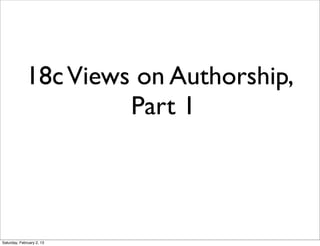
18c Views on Authorship, Part 1
- 1. 18c Views on Authorship, Part 1 Saturday, February 2, 13
- 2. Saturday, February 2, 13
- 3. Adrian Johns: • Full Professor, University of Chicago • Department of History • Areas of Expertise: • history of the sciences • history of the book and media • intellectual piracy and property from the Renaissance to the present Saturday, February 2, 13
- 4. Saturday, February 2, 13
- 5. which counters this book: Saturday, February 2, 13
- 6. Saturday, February 2, 13
- 7. Let’s sort out our arc. Saturday, February 2, 13
- 8. Jess: How do I critique, interpret, and/or respond to history? Saturday, February 2, 13
- 9. How does craft come into all this? Saturday, February 2, 13
- 10. Tamara: The thing about pirates or craftsmen of any guild is this: “pirates were essentially members of any social institution of civility of which was not integrated with the broader commonwealth’s. The point was that most collective groups, such as guilds, companies, or universities, maintained customary practices that both bound them together and secured them as harmonious elements in the commonwealth…A pirate crew was a collective, all right, but it honored no propriety recognizable to the commonwealth at large, and it owed no allegiance to the common good” (37). Saturday, February 2, 13
- 11. Lindsey: ... Johns writes that “Precisely when authorship took on a judge of public authority, through crafts of the printed book, its violation came to be seen as a paramount transgression—as an offense against the common good akin to the crime of brigand, bandit, or pirate” (19). I turn to this quote because it highlights the beginnings of the cultural capital of the printed book. The cultural concept of “a book” is still a profound and resonating form of authority in today’s culture even in spite of the age of new media. While I recognize that a book, a printed book, carries cultural capital or as Johns puts it “a judge of public authority,” I wonder at what exactly about print that affords that authority and capital. ... Saturday, February 2, 13
- 12. It is a given that print—a printed book—gives an artifact authority. The prominence and importance of print is highlighted by the fact that one a book was put into print, concepts of piracy began. What is it about print that caused such the public to see piracy as “a paramount transgression” that still exists centuries later in our culture? Saturday, February 2, 13
- 13. Jess: By mid-18th century: “plagiary could be piratical; so could epitomizing, or abridging, or even translating” (46). At what point is knowledge public property? To me, this idea of translating being piratical is interesting because that, as well as abridging, challenges many of the current conceptions of being a compiler or even translator. What’s at stake in calling these things “piracy”? Saturday, February 2, 13
